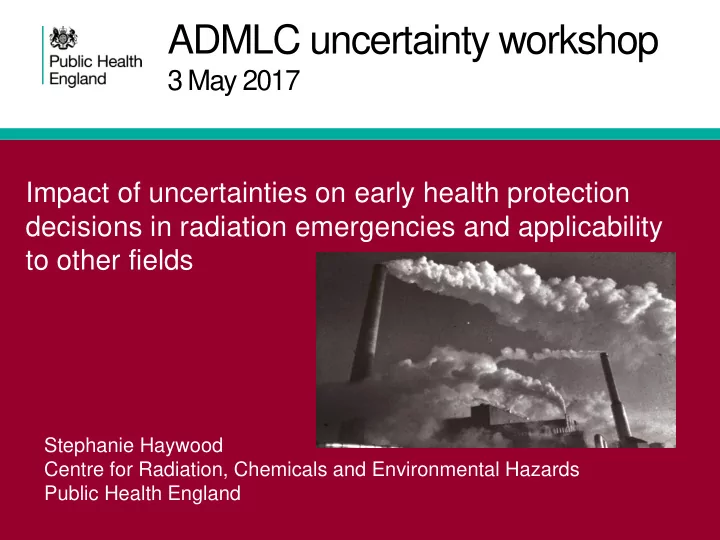

ADMLC uncertainty workshop 3 May 2017 Impact of uncertainties on early health protection decisions in radiation emergencies and applicability to other fields Stephanie Haywood Centre for Radiation, Chemicals and Environmental Hazards Public Health England
This presentation outlines… • Outlines uncertainty in early dose assessments in a nuclear or radiological emergency • Implications of this uncertainty for public health advice and presenting uncertain information • Some problems - which may relate to other situations 2
Early emergency assessments • Need rapid decisions on health protection • What potentially significant information is not yet known? • Hazards of unneeded countermeasures (eg risks of unnecessary evacuation) • Hence need to be able to explain the uncertainty in dose estimates to decision-makers 3
Emergency assessments Inputs to assessments Accidental Measurements release Assessments Dose Estimated modelling Contamination pattern source Site Doses term data Dispersion & Weather deposition Countermeasures modelling advice Environmental sheltering modelling stable iodine evacuation etc 4
All components contain uncertainties, Emergency assessments and calculations are approximations Accidental Measurements release Assessments Dose Estimated modelling Contamination pattern source Site Doses term data Dispersion & Weather deposition Countermeasures modelling advice Environmental sheltering modelling stable iodine evacuation etc 5
Uncertainties in assessments include … • what has been released (amounts and radionuclides) • what the time distribution of the release is likely to be • features of the release (eg particle size and release energy) • what influence the weather has had so far • future weather – may be several/many alternative predictions • monitoring data – how reliable, is it being interpreted correctly? • combinations of uncertainty – eg increase in amount released coinciding with change in weather such as onset of rain 6
Uncertainties in assessments include … • what has been released (amounts and radionuclides) • what the time distribution of the release is likely to be • features of the release (eg particle size and release energy) • what influence the weather has had so far • future weather – may be several/many alternative predictions • monitoring data – how reliable, is it being interpreted correctly? • combinations of uncertainty – eg increase in amount released coinciding with change in weather such as onset of rain How to deal with these in assessments? How to present the results to decision-makers? 7
Presenting uncertain information • Work in the UK (Warwick University, UK Met Office, PHE) – funded by ADMLC - described later • Developing techniques for presenting uncertainty to decision- makers, focusing on radiological emergencies • Workshops of UK government experts and agencies have explored how uncertainty is understood and what is needed in presentation 8
Some conclusions (1) • Predicting consequences of radiation accidents in early hours long recognised to have many uncertainties • Many decision support systems developed in the last 20 years – few do uncertainty and none do it comprehensively • Where done, the emphasis is on weather permutations • Source term uncertainty seldom if ever included 9
Some conclusions (2) • The assumptions on which the analyses are built are often pessimistic … • … and concentrate on worst case doses, not other outcomes (eg agricultural effects or economic impact) • Interactions between uncertainties eg release duration and weather ignored • A more comprehensive treatment of the key uncertainties is needed for providing advice to decision makers 10
Additional thought for discussion Does the view of uncertainty vary depending on who you are? eg scientists, government decision-makers, public, media Is uncertainty likely to be well-received by decision – makers in an emergency? • is it likely to be appreciated as offering greater insight? • or will it be seen as an unwelcome complication? How can it be made to be the expected format? 11
Any questions? 12
Recommend
More recommend